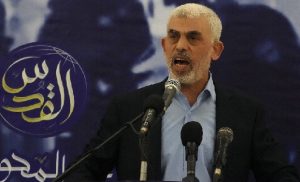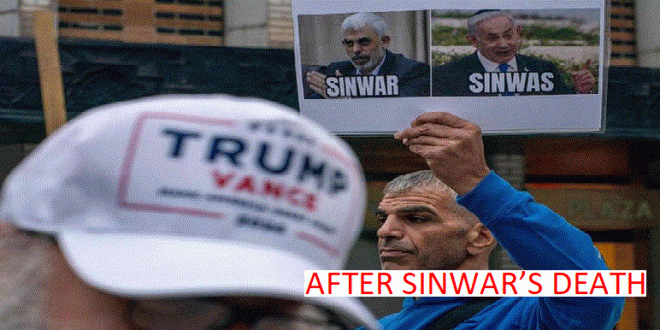20-10-2024
JERUSALEM: The killing of Hamas leader Yahya Sinwar, a mastermind of the attack that ignited the war in the Gaza Strip, marked a major triumph for Israel. But Israeli leaders are also seeking to lock in strategic gains that go beyond military victories to reshape the regional landscape in Israel’s favour and shield its borders from any future attacks, sources familiar with their thinking say.
 With US elections approaching, Israel is rushing to inflict maximum damage on Hamas in Gaza and Hezbollah in Lebanon, and seizing the moment to carve out de facto buffer zones in a bid to create an irreversible reality before a new president takes office in January, eight sources told Reuters.
With US elections approaching, Israel is rushing to inflict maximum damage on Hamas in Gaza and Hezbollah in Lebanon, and seizing the moment to carve out de facto buffer zones in a bid to create an irreversible reality before a new president takes office in January, eight sources told Reuters.
By intensifying its military operations against Hezbollah and Hamas, Israel wants to ensure that its enemies and their chief patron, Iran, don’t regroup and threaten Israeli citizens again, according to Western diplomats, Lebanese and Israeli officials, and other regional sources.
US President Joe Biden is expected to use Sinwar’s killing to pressure Israeli Prime Minister Benjamin Netanyahu to wind down the war in Gaza but the Israeli leader may prefer to wait out the end of Biden’s term and take his chances with the next president, whether the Democratic candidate, Vice President Kamala Harris, or Republican rival Donald Trump, with whom Netanyahu has had close ties.
Before considering any ceasefire agreements, Israel is accelerating its military campaign to push Hezbollah away from its northern border while thrusting into Gaza’s densely packed Jabalia refugee camp in what Palestinians and UN agencies fear could be an attempt to seal off northern Gaza from the rest of the enclave.
It is also planning a response to a ballistic-missile barrage carried out by Iran on Oct. 1, its second direct attack on Israel in six months.
“There is a new landscape, a new geopolitical change in the region,” said David Schenker, a former US assistant secretary of state for Near Eastern affairs who is now a senior fellow at the Washington Institute think tank.
 Before Hamas’ attack on Oct. 7, 2023, Israel was “willing to tolerate a high-level threat”, responding to rocket fire from the Palestinian militant group and other foes with limited strikes, Schenker said. “No longer.”
Before Hamas’ attack on Oct. 7, 2023, Israel was “willing to tolerate a high-level threat”, responding to rocket fire from the Palestinian militant group and other foes with limited strikes, Schenker said. “No longer.”
“This time Israel is fighting on many fronts. It’s Hamas; it’s Hezbollah, and Iran is coming soon,” he said.
Hamas-led fighters killed around 1,200 people and seized more than 250 hostages during the assault in southern Israel, according to Israeli tallies. Israel’s subsequent offensive has killed more than 42,000 Palestinians in Gaza, according to health authorities in the enclave.
Netanyahu said in a statement on Thursday that Sinwar’s death “settled the score”, but he warned that the Gaza war would continue with full force until Israel’s hostages were returned. His office said it had nothing further to add.
Israeli military spokesman Rear Admiral Daniel Hagari said Sinwar’s elimination marked a “great achievement” in efforts to destroy Hamas’ military apparatus, but added there were other commanders in Gaza.
On Friday, Hamas’ deputy leader in Gaza, Khalil al-Hayya, confirmed Sinwar’s death and said Israeli hostages would not be returned until Israeli “aggression” ended and its forces withdrew. Israeli forces have inflicted other big blows on its enemies.
A series of high-profile strikes wiped out senior leaders including Hamas political chief Ismail Haniyeh, Mohammed Deif, head of its miliary wing, Hezbollah leader Sayyed Hassan Nasrallah and its top military commander, Fuad Shukr. (Int’l News Desk)
 Pressmediaofindia
Pressmediaofindia




